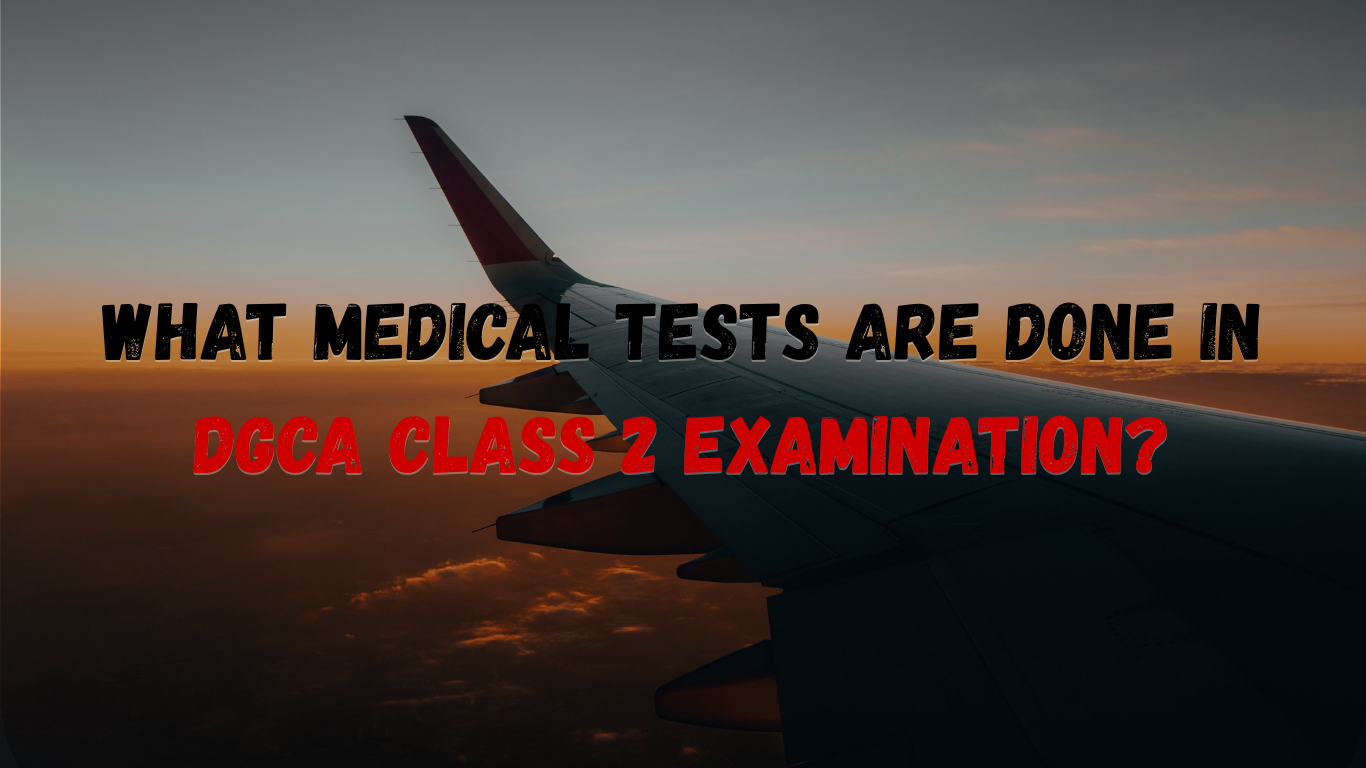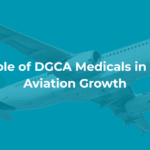
Before you can touch the skies as a pilot in India, you must prove that you are fit to fly. The DGCA Class 2 Medical Examination is the first and most essential step for every aspiring pilot. Conducted by DGCA-approved medical examiners, this test ensures that your body and mind meet the aviation safety standards set by the Directorate General of Civil Aviation (DGCA).
But what exactly happens during this examination? What tests are performed? How can you prepare for them?
Let’s explore the complete list of medical tests done in the DGCA Class 2 Examination and what each one means for your aviation career.
What is the DGCA Class 2 Medical Examination?
The DGCA Class 2 Medical Examination is a mandatory health assessment required before applying for a Student Pilot License (SPL) in India. It is designed to evaluate whether a candidate is physically and mentally fit to operate an aircraft safely. This examination is usually done by a DGCA-approved doctor (AME) and includes a range of physical and diagnostic tests. Once cleared, your results are uploaded to the eGCA portal, where DGCA verifies and issues your Class 2 Medical Assessment. Read Also:- DGCA Class 2 Medical Tests: Top 10 Cities in India (2025 Guide)List of Medical Tests Done in DGCA Class 2 Examination
The DGCA Class 2 Medical involves multiple tests across different health categories. Below is the detailed breakdown of all the tests you will undergo:1. General Physical Examination
This is the first stage of the DGCA medical process. The doctor checks your overall health and appearance. It includes:- Height and weight measurement
- Body Mass Index (BMI) calculation
- Blood pressure (BP) reading
- Pulse rate and heart rate
- Posture, gait, and physical symmetry
- Examination of the abdomen and chest
2. Vision (Eye) Test
Since pilots rely heavily on their vision, this is one of the most crucial parts of the DGCA Class 2 Medical Examination. Tests included:- Distant Vision: Using the Snellen chart (should be 6/6 in each eye, with or without correction).
- Near Vision: Tested using the N5 chart (for reading instruments).
- Colour Vision: Using Ishihara plates to detect colour blindness.
- Eye Muscle Balance: To check coordination between both eyes.
- Field of Vision Test: Ensures no peripheral vision loss.
3. ENT (Ear, Nose, Throat) Examination
Your hearing and balance systems are vital in aviation. Tests include:- Audiometry Test: Measures hearing capacity and detects any ear defects.
- Tympanic Membrane Check: Ensures the eardrum is healthy.
- Nose and Throat Inspection: To rule out infections or blockages.
- Sinus Health Check: Pilots often fly at high altitudes; blocked sinuses can be risky.
4. ECG (Electrocardiogram)
The ECG test records your heart’s electrical activity. It helps detect heart rhythm problems, arrhythmias, and other cardiac stress issues. Purpose: To ensure the pilot’s heart functions normally under stress or altitude variation.5. Chest X-Ray
A chest X-ray (PA view) is mandatory to detect lung or heart abnormalities. It helps identify conditions such as tuberculosis, lung infections, or heart enlargement. Purpose: To confirm that your respiratory and cardiovascular systems are healthy.6. Blood Tests
A complete blood test is performed to assess your overall health and detect any underlying conditions. Usually includes:- Haemoglobin (HB)
- Blood sugar (Fasting & Postprandial)
- CBC (Complete Blood Count)
- Liver Function Test (LFT)
- Kidney Function Test (KFT)
- Lipid Profile (if required)
7. Urine Test
A urinalysis checks for sugar, protein, or infection in your urine. It helps identify conditions such as diabetes or urinary tract infections. Purpose: To ensure your kidneys and urinary system are functioning normally.8. Dental Check-Up
A dental test is performed to detect infections, cavities, or gum problems. Untreated dental issues can cause severe pain during cabin pressure changes. Purpose: To ensure oral hygiene and no risk of sinus-related pain during flight.9. Psychological & Mental Health Assessment
Flying demands mental alertness, focus, and calmness under pressure. The examiner may ask basic questions or use a short psychological test to check your mental fitness. Checks include:- Reaction time and coordination
- Emotional stability
- Stress tolerance
10. Additional Tests (if recommended)
Depending on your medical history, the DGCA doctor may recommend extra tests such as:- Pulmonary Function Test (PFT)
- Ultrasound abdomen
- Blood pressure monitoring over 24 hours
- Specialist referral (Ophthalmologist, Cardiologist, etc.)
Required Documents for DGCA Class 2 Medical Examination
Before visiting the doctor, keep these documents ready:- Valid ID proof (Aadhaar, Passport, etc.)
- Recent passport-size photographs
- DGCA Medical Form (available on eGCA portal)
- Previous medical reports (if any)
- Appointment confirmation printout
Cost of DGCA Class 2 Medical Examination in India
The cost varies from city to city and examiner to examiner. On average:- Consultation Fee: ₹1000 – ₹1500
- Lab Tests & X-ray: ₹1000 – ₹1500
- Total Estimated Cost: ₹2000 – ₹3000
How Long Does the Process Take?
The entire DGCA Class 2 Medical Examination usually takes 1–2 hours at the medical centre. After the doctor uploads your results to eGCA, DGCA generally approves the report within 7–10 working days. You’ll then receive your official DGCA Class 2 Medical Assessment via the eGCA portal.Common Mistakes to Avoid
- Not booking your appointment early
- Forgetting to fast before a blood sugar test
- Not bringing prescription glasses
- Giving the wrong email or DGCA ID on the eGCA portal
- Ignoring minor health issues before the exam
Tips to Prepare for DGCA Class 2 Medical
- Get 7–8 hours of sleep before the test
- Stay hydrated and avoid oily food
- Don’t consume caffeine or alcohol 24 hours before
- Carry all required documents neatly arranged
- Visit a DGCA-approved examiner only (check eGCA list)
Where to Get DGCA Class 2 Medical Done
You can take the DGCA Class 2 medical test in any DGCA-approved city, such as: Delhi, Mumbai, Pune, Bengaluru, Hyderabad, Jaipur, Chennai, Kolkata, Ahmedabad, or Kochi. If you need help finding the nearest approved doctor, Top Crew Aviation can guide you through the appointment booking and eGCA upload process.Conclusion: Your Health is Your License to Fly
The DGCA Class 2 Medical Examination is more than just a formality — it’s proof that you are ready, fit, and capable of taking command in the cockpit. Understanding which medical tests are performed during the DGCA Class 2 examination helps you prepare confidently and avoid last-minute stress. Once you clear this medical, you’re officially one step closer to earning your Student Pilot License (SPL) and beginning your dream of becoming a pilot. If you’re unsure about how to book your DGCA medical, find approved examiners, or upload your reports on eGCA, Top Crew Aviation can guide you every step of the way. From Class 2 medical assistance to pilot training and license support, Top Crew Aviation helps you take off with confidence and clarity.Frequently Asked Questions
What is checked in the DGCA Class 2 Medical Examination?
Your eyesight, hearing, blood, ECG, chest X-ray, and general health are checked to ensure overall fitness.
Who conducts DGCA Class 2 Medical Tests?
Only DGCA-approved doctors listed on the eGCA portal can conduct the examination.
How long is the DGCA Class 2 Medical valid?
It's valid for 2 years for applicants below 40 and 1 year for those above 40.
Can I wear glasses during the test?
Yes, you can. Just bring your prescription.
What if I fail the DGCA Class 2 Medical?
You can reapply after addressing the health issue or getting a review from a specialist.



